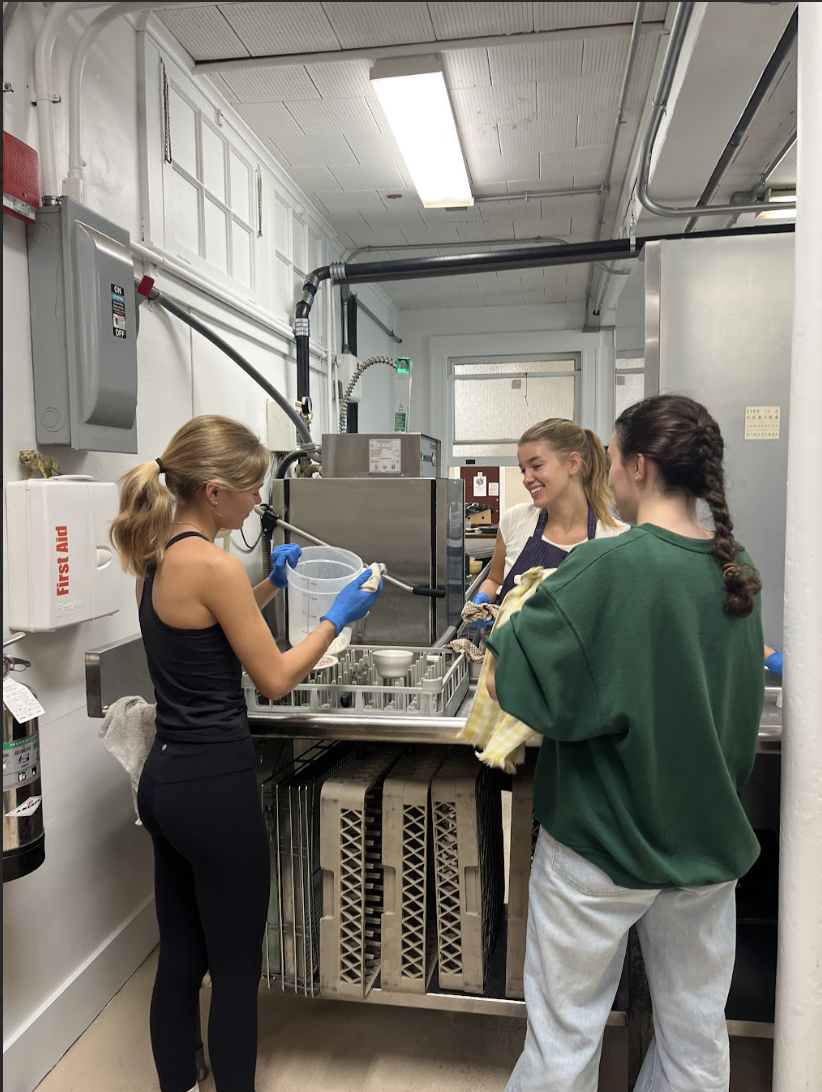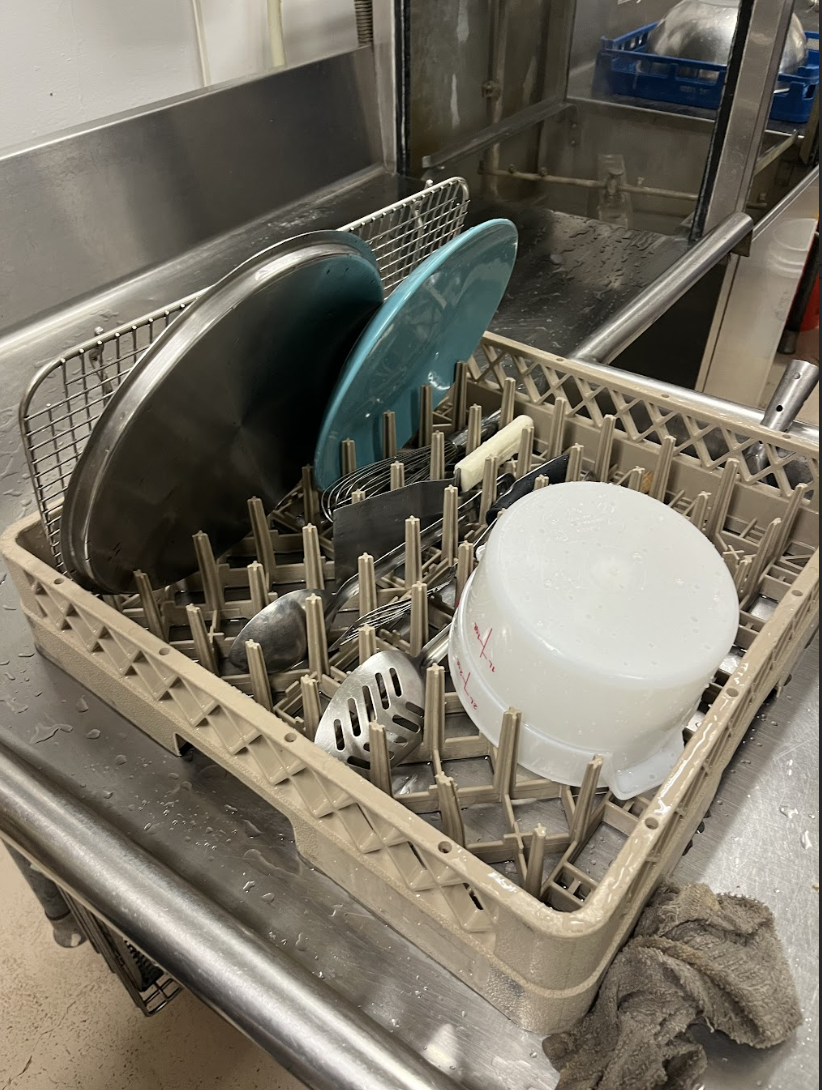Not Bread Alone Serves Up Food and Community

On the ground floor of the First Congregational Church, nestled in the heart of the town of Amherst, is Not Bread Alone (NBA), a service-based program that provides food and community to those in the area who need it most. Many individuals who attend NBA meals are unhoused, living in subsidized housing, or have experience with mental health or substance abuse issues.
A couple of Sundays ago, we volunteered at Not Bread Alone. We signed up for the second shift of the night, entering in the midst of a buzz of conversation. Brown paper to-go bags shuffled in the background as volunteers moved around each other picking up and placing down hot pans, laughing as they scrubbed utensils in the sink. We tied back our hair, pulled on plastic gloves, and began to dry dishes and silverware off the rack. The veteran volunteers played air traffic control, directing our newly-dried items to their precise locations.
As soon as the dishes were done, there were meals to be served. We exchanged our sudsy gloves for clean new ones and wheeled our first cart out of the kitchen. Although intent on emptying our pot of vegetables and tofu, we were soon sidetracked, stuck in conversation with the patrons we were serving. By the time we brought our cart back to the kitchen, we found ourselves moving differently — according to the rhythm of the community we had joined.

Not Bread Alone began in September 1983, when several women from the Congregational Church came together to serve food to community members in need. After a while, the demand became too great for volunteers. The program was eventually taken over by the Center for Human Development (CHD), and has since brought on full and part-time staff and volunteer members to support its mission.
In addition to providing meals, NBA is driven by a passion to foster communal bonds by allowing people to gather and share food with each other. The name ‘Not Bread Alone’ is a reference to a line from the Bible: “A man does not live by bread alone, but by every word from the mouth of God.”
Bob Stover, the current supervisor of the program, discovered NBA in 2004. “In 2004, I started attending the church upstairs, and I realized that … the program down here was pretty special,” Stover said. After many years of volunteering and co-supervising, Stover became the sole head of the program in 2020.
Stover speaks highly of the current NBA volunteers, many of whom have become regulars. “We’re always blessed,” Stover said. “They’re reliable. They work hard while they’re here.”
NBA serves three meals a week: lunches on Saturday and Sunday and dinners on Wednesday. Each meal has two volunteer shifts — during the first, volunteers cook and prepare food and in the second, they serve it to guests. Volunteering shifts run from 9 a.m.-12 p.m. and 11:45 a.m. -2:30 p.m. on weekends and 12-4 p.m. and 3:45-6:30 p.m. on Wednesdays.
The program operates off of both food and monetary donations. Donations from local grocery stores are an integral part of the support NBA receives. “The food comes … from Whole Foods on Saturday morning or Big Y on Wednesday mornings,” Stover said. “And Atkins will give us [food] on Sunday mornings.”
Stover acknowledged that the program has changed significantly since the time he started working. In particular, Covid considerably shifted the way NBA operated.
“We completely transformed our procedures so that what now we think of as to-go meals, that was all of our meals,” Stover remembered. “And we were passing them out on the sidewalk out there, through the winter, through snowstorms, whatever. And then one June, I think we said, ‘Okay, we’ll bring it back in.’”
Recently, NBA has been working more with the Five College Consortium to foster connections among the schools. “We’ve got some channels to UMass. The development of getting close to Amherst College is pretty recent … and very gratifying,” Stover said.
Senior Lecturer in Spanish Carmen Granda has incorporated a visit to Not Bread Alone into a unit on food with her Spanish 102: Fundamentals of Spanish Language and Culture II course, working with the Center for Community Engagement.
Volunteering was important to Granda because she wanted to apply the knowledge she was teaching in the classroom to the real world, while simultaneously giving back to the Amherst community. “I wanted to … do something that was going to be engaging for students and is relevant to what’s going on in the world. That’s something that we do across all language classes,” she added.
Granda remarked that it was amazing to see how her students interacted with people from the community. “I really enjoyed seeing the students outside of the classroom and working together,” Granda said. “They had to write reflections after, and many students commented that they were surprised by how many people in the community were in need of this type of service.”
Last year, Natasha Savianu ’25, an organizer for the Center for Religious and Spiritual Life (RSL), started a program connecting clubs, teams, and affiliation groups on Amherst’s campus with NBA.
“Each week, volunteers meet with me for free coffee prior to our shift,” Savianu shared. “[It is] a great way to get acquainted with each other and discuss the meaning of service.” Though she feels that not enough students are aware of NBA, she believes her program has actively started to change that.“It is so encouraging to see people that I’ve taken to NBA return to volunteer on their own,” she said.
Volunteering has become a part of Savianu’s position; she feels that working at NBA has helped her personally build a sense of community — both with her fellow volunteers and those outside of the kitchen.
“Many of the guests are regulars. We get to know their names and they get to know ours,” Savianu said. “It makes me feel at home, which is important since almost every college student feels homesick at some point.”
In addition to her appreciation of the patrons and her fellow volunteers, Savianu spoke highly of Stover.
“[He] is probably the most wonderful human I’ve ever met.” Savianu said. “He runs the whole program by himself, has amazing taste in jazz music — reflected in our Spotify cooking playlists — and makes the funniest grandad jokes,”
Stover, however, refused to praise himself. “I’m [not] a saint,” he shared. “I am mostly a guy with a job, and I want to show the world I can do a good job here.” For Stover, the program is important to him because of everyone else involved.
“I think that what you’re seeing here … is a group of people who are relishing the fact that it’s a communal experience, that they’re with other people, people they know, they’re sitting, they’re talking, as well as eating,” Stover said. “I think that’s a distinctive part of Not Bread Alone.”
He also spoke about the comfort he now feels in his role. “In the early days, I’d have it planned out very thoroughly,” he said. “I would have probably dug out recipes and made copies of them. I would have bought a whole bunch of particular ingredients that those recipes called for … But now I feel more comfortable saying, ‘Okay, well, we’ve got a bunch of chicken today. What are you going to do with it?’”
Stover’s favorite moments at NBA occur “in the middle of a meal with a big crowd and with everybody happy, pretty big buzz of conversation, everybody’s enjoying the food, everybody’s enjoying each other. And there’s this buzz at that time and that’s highly satisfying.” While NBA has proved a special place for Granda’s class, Sover, and Savianu — anyone can email Stover for the SignUpGenius at RStover@chd.org. Most help is needed on Wednesdays and throughout the summer.
The experience of volunteering is perhaps best summed up by Savianu: “For three hours of my week, I am given the opportunity to disappear, put my phone away in the NBA pantry, and not focus on anything other than being helpful.”